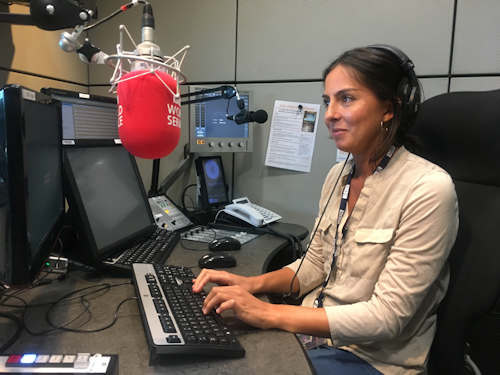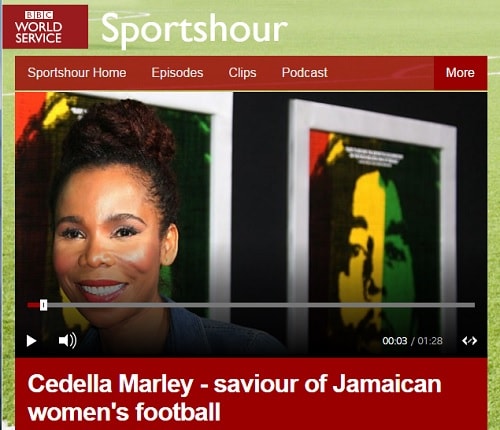Miriam Walker-Khan
Miriam is a trainee sports journalist at the BBC. She graduated from Manchester with a BA in English Literature and French in 2016.
Here, she talks about what she does and how she got there following her time at Manchester.
On my BBC trainee scheme
I'm currently on the BBC's Journalism Trainee Scheme (JTS) as the sports trainee at BBC Sport. The JTS year includes three months at Online, Radio and TV respectively, as well as loads of incredible training weeks from the BBC Academy.

During my time at Online, I wrote for the BBC Sport website and worked with the social media and the digital video teams. At Radio, I mainly worked with the World Service, but I also worked on sport bulletin shifts for Radio 5 Live and Radio 4.
The highlight was producing a 30-minute show alone with just a presenter. Being able to put out such a fast-paced news show on the biggest radio station in the world is pretty cool, and a good example of being pushed in (and loving) the deep end!
I also produced and interviewed for other stories, including one on the hijab in sport, as well as a story on how Bob Marley's daughter, Cedella, is reviving women's football in Jamaica.
Now, I'm at TV, working as an assistant producer and editing footage for TV all day!
On why I love my job
I love talking to and meeting new people and finding out their stories, so it's really my ideal job. But the most rewarding element is being able to find and tell stories from communities or cultures that are usually not talked about or represented as much.
I grew up seeing a lot of the same faces in the media and saw the distrust that some communities felt towards it, so it's amazing to tell stories that defy stereotypes and push boundaries for an under-served audience, as well as to use my own life experiences to find and tell those stories.
I also love being creative and making things every single day.
On getting into journalism
I fell into sports journalism after being a track and field athlete myself for many years. For three years as a student, I was editor of the biggest website in the UK dedicated to athletics.

It led to more work in sports journalism, including a lot of travelling and using my French, and I very quickly realised that I wanted to make a career out of it, so got as much experience I could.
After I graduated, I did a master's in Broadcast Journalism at the University of Sheffield. It was a very practical course and has helped me loads at the BBC. I then did an internship at BBC Radio 1/1Xtra/the Asian Network (the Where it Begins scheme), which was without a doubt the most exciting few months of my life.
I got to do some incredible stuff, and it really cemented my love for radio and showed me how much I needed to work in a place where I had to be creative every day. I went straight from the internship to the JTS.
I'd like to carry on working as a sports journalist, and maybe one day as a TV/radio reporter. I also love making my own videos, so video journalism is something I want to get into.
On life at Manchester
The beauty of studying English Literature and French is that it felt like I was also doing history, film, sociology and linguistics degrees, because both subjects are so vast and varied.
For example, in my second year, I studied an American Studies/English Literature module that covered African American history and literature from slavery all the way to the civil rights and Black Power movements.
I then chose to write my final-year dissertation on the cultural representation of police brutality in the civil rights movement in 21st-century texts (the graphic novel trilogy March and Ava DuVernay's film Selma).
I also studied a French film module in my final year, which was absolutely fantastic and made me realise how much I loved film. Even now, I think back to that module when I’m video-editing - about things that I wouldn't have known existed without that module.
Of course, having a language is invaluable and I am so glad I decided to study French. The core language modules are structured fantastically and taught me how to be independent when learning a language, which, in my opinion, is crucial. Manchester has excellent links for universities around the world when it comes to your year abroad. The staff members in the French department were also the most helpful people I came across at Manchester.
After my first year of university, I was confident enough to interview athletes in French for sports journalism work all over Europe in the summer, so studying a language was an important part of my career from just one year into my undergrad degree!
Also, being at such a huge university really helped me find out what I'm passionate about and what I loved doing. There are so many societies, clubs and sports teams at Manchester, and people from cultures and countries all over the world. Every September, I went to the careers fairs and got leaflets for everything. Then I went to various volunteering clubs/societies and decided which ones I enjoyed.
I left university with such a huge amount of stuff on my CV and, because of all the different people I met, with great social skills. Also, being at such a big university meant being able to do loads of new stuff. For example, I thought our athletics club would benefit from having a media officer, so I just created the role for myself!
On advice for budding journalists
Be bold, and be confident! Don't be put off by how competitive the industry is. Apply to the schemes and traineeships. I walked into my assessment centre for the JTS super relaxed because I thought there was no way I'd get the one sport place on a scheme that thousands of people apply for. This probably brought out more of my personality and it definitely allowed me to be proud of what I'd already achieved.
And be curious. Everyone says ideas are your currency in journalism, so if you can show that you're creative and can find interesting new stories and angles, then be confident and use that!
